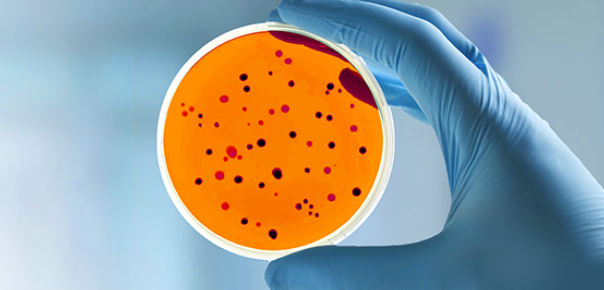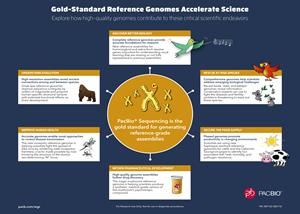MENLO PARK, Calif.,
|
|||||
Today, the
The VGP is one of many large-scale international projects that have chosen PacBio® Single Molecule, Real-Time (SMRT®) Sequencing to generate some of the most complete genomes to date for thousands of plant, animal, fungal and bacterial species. These comprehensive catalogs of genetic code provide valuable resources to researchers in their quest to understand the biology, physiology, development and evolution of a multitude of living organisms, and will aide in their conservation.
“We are honored to work with world-class researchers to generate high-quality genome references and support large-scale efforts such as the VGP,” said Jonas Korlach, Chief Scientific Officer of Pacific Biosciences. “We are looking forward to continuing our involvement in projects like these to benefit science, society and the environment.”
Other major projects using or that recently used PacBio SMRT Sequencing include:
- The Bird 10,000
Genomes (B10K) Project , which is aiming to generate representative draft genome sequences from all extant bird species; many of its members became founders of the The Genome 10,000 consortium (G10K), which evolved into theVertebrate Genome Project ; - The Bat1K initiative to catalog the genetic diversity in 1,300 types of bats;
- Efforts to sequence nationally significant species, such as the Sanger 25 Project by the
Wellcome Trust Sanger Institute and the Canada 150 Sequencing Initiative (CanSeq150) by Canada’s Genomics Enterprise. - The NCTC 3000 initiative by the UK’s National Collection of Type Cultures to sequence the genomes of 3,000 strains of bacteria;
Whole Genome Assembly of the Maize NAM Founders, a multi-institutional effort to create a 26-line pangenome maize reference collection, one of many initiatives to sequence important agricultural crops to discover and utilize novel genes, traits and/or genomic regions for crop improvement and basic research;- The Functional Annotation of
Animal Genomes Project (FAANG), which is aiming to produce comprehensive maps of functional elements in the genomes of domesticated animal species; - Marine and aquaculture efforts such as
The Aqua-Hundred Genome Project ; and - Insect initiatives, including the i5k Project to sequence 5,000 arthropod genomes and
The Global Ant Genomics Alliance (GAGA) to sequence 200 ant species. - The Pan-Genome Analysis of Sorghum project at the
Donald Danforth Plant Science Center , which includes 15 sorghum lines covering the diversity of this important bioenergy, food, and feed crop. The project is supported through the Community Science Program (CSP) of theDOE Joint Genome Institute with PacBio sequencing atHudsonAlpha Institute for Biotechnology . - The Open Green Genomes Initiative, also supported by
DOE Joint Genome Institute , which will generate high-quality genome assemblies and annotations for 35 species representing all major evolutionary lineages in the land plant tree of life.
Researchers are using PacBio’s advanced technology to create high-quality reference genomes, which become highly curated representations of the species for the community to which all individuals of that species are compared. The information provided by these detailed DNA analyses can help in the conservation of animal species and their habitats; it may also have implications for the human species.
Bats, for instance, are reservoirs for some of the deadliest viral diseases, including Ebola and SARS (severe acute respiratory syndrome), but somehow they survive. Figuring out why could increase our understanding of immune function. Information gleaned from their genomes could also contribute to our understanding of human aging and boost agricultural productivity and ecosystem restoration, according to Sonja Vernes of the
“The long-read sequencing technology from PacBio is allowing us to produce bat genomes of unprecedented quality and resolution as part of the Bat1K project,” said Vernes. “This is going to be a big step forward for understanding how the genes and also the non-coding DNA in these genomes influence the weird and wonderful features of bats.”
An infographic describing how high-quality genomes contribute to these critical scientific endeavors is available here. More information about today’s news from the VGP is available here.
About Pacific Biosciences
Forward-Looking Statements
All statements in this press release that are not historical are forward-looking statements, including, among other things, statements relating to future availability, uses, accuracy, quality or performance of, or benefits of using, products or technologies, the suitability or utility of methods, products or technologies for particular applications, studies or projects, the expected benefits of sequencing projects, and other future events. You should not place undue reliance on forward-looking statements because they involve known and unknown risks, uncertainties, changes in circumstances and other factors that are, in some cases, beyond Pacific Biosciences’ control and could cause actual results to differ materially from the information expressed or implied by forward-looking statements made in this press release. Factors that could materially affect actual results can be found in Pacific Biosciences’ most recent filings with the
Pacific Biosciences undertakes no obligation to revise or update information in this press release to reflect events or circumstances in the future, even if new information becomes available.
Contacts
Media:
Nicole Litchfield
415.793.6468
nicole@bioscribe.com
Investors:
Trevin Rard
650.521.8450
ir@pacificbiosciences.com
A photo accompanying this announcement is available at http://www.globenewswire.com/NewsRoom/AttachmentNg/ed4515d5-df74-4154-831f-ef31efebf492
Source: Pacific Biosciences, Inc.










